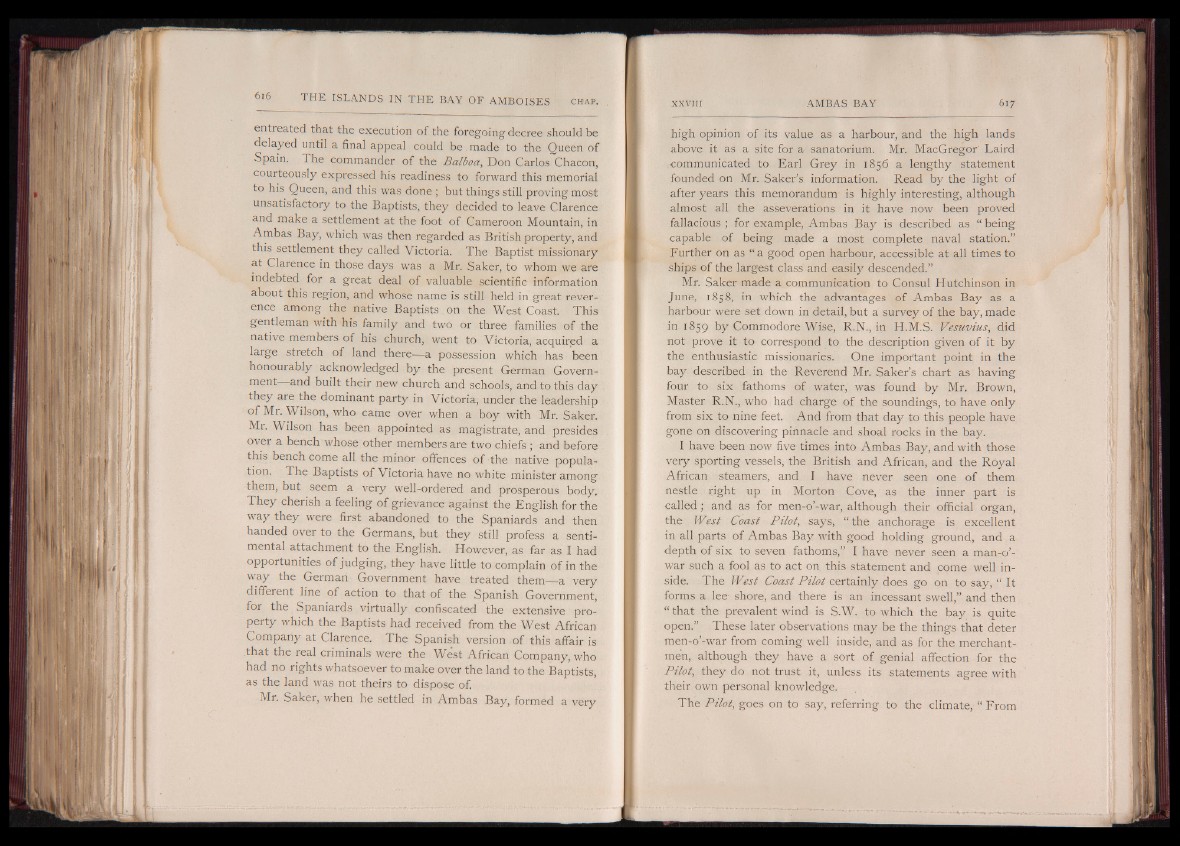
entreated that the exécution of the foregoing decree should be
delayed until a final appeal could b e . made to the Queen of
Spain. The commander of the Balboa, Don Carlos Chacon,
courteously expressed his readiness to forward this memorial
to his Queen, and this was done ; but things still proving most
unsatisfactory to the Baptists, they decided to leave Clarence
and make a settlement at the foot of Cameroon Mountain, in
Ambas Bay, which was then regarded as British property, and
this settlement they called Victoria. The Baptist missionary
at Clarence in those days was a Mr. Saker, to whom we are
indebted for a great deal of valuable scientific information
about this region, and whose name is still held in great reverence
among the native Baptists, on the West Coast. This
gentleman with his family and two or three families of the
native members of his church, went to Victoria, acquired a
large stretch of land there— a possession which has been
honourably acknowledged by the present German Government
and built their new church and schools, and to this day
they are the dominant party in Victoria, under the leadership
o f Mr. Wilson, who came over when a boy with Mr. Saker.
Mr. Wdson has been appointed as magistrate, and presides
over a bench whose other members are two chiefs ; and before
this bench come all the minor offences of the native population.
The Baptists of Victoria have no white minister among
them, but seem a very well-ordered and prosperous body.
They cherish a feeling of grievance against the English for the
wa3' they were first abandoned to the Spaniards and then
handed over to the Germans, but they still profess a sentimental
attachment to the English. However, as far as I had
opportunities of judging, they have little to complain of in the
way the German Government have treated them— a very
different line of action to that of the Spanish Government,
for the Spaniards virtually confiscated the extensive property
which the Baptists had received from the West African
Company at Clarence. The Spanish version of this affair is
that the real criminals were the West African Company, who
had no rights whatsoever to make over the land to the Baptists,
as the land was not theirs to dispose of.
Mr. Saker, when he settled in Ambas Bay, formed a very
high opinion of its value as a harbour, and the high lands
above it as a site for a sanatorium. Mr. MacGregor Laird
communicated to Earl Grey in 1856 a lengthy statement
founded on Mr. Saker’s information. Read by the light of
after years this memorandum is highly interesting, although
almost all the asseverations in it have now been proved
fallacious; for example, Ambas Bay is described as “ being
capable of being made a most complete naval station.”
Further on as “ a good open harbour, accessible at all times to
ships of the largest class and easily descended.”
Mr. Saker made a communication to Consul Hutchinson in
June, 1858, in which the advantages of Ambas Bay as a
harbour were set down in detail, but a survey of the bay, made
in 1859 by Commodore Wise, R.N., in H.M.S. Vesuvius, did
not prove it to correspond to the description given of it by
the enthusiastic missionaries. One important point in the
bay described in the Reverend Mr. Saker’s chart as having
four to six fathoms of water, was found by Mr. Brown,
Master R.N., who had charge of the soundings, to have only
from six to nine feet. And from that day to this people have
gone on discovering pinnacle and shoal rocks in the bay.
I have been now five times into Ambas Bay, and with those
very sporting vessels, the British and African, and the Royal
African steamers, and I have never seen one of them
nestle right up in Morton Cove, as the inner part is
called; and as for men-o’-war, although their official organ,
the West Coast Pilot, says, “ the anchorage is excellent
in all parts of Ambas Bay with good holding ground, and a
depth of six to seven fathoms,” I have never seen a man-o’-
war such a fool as to act on this statement and come well inside.
The West Coast Pilot certainly does go on to say, “ It
forms a lee shore, and there is an incessant swell,” and then
“ that the prevalent wind is S.W. to which the bay is quite
open.” These later observations may be the things that deter
men-o’-war from coming well inside, and as for the merchantmen,
although they have a sort of genial affection for the
Pilot, they do not trust it, unless its statements agree with
their own personal knowledge.
The Pilot, goes on to say, referring to the climate, “ From